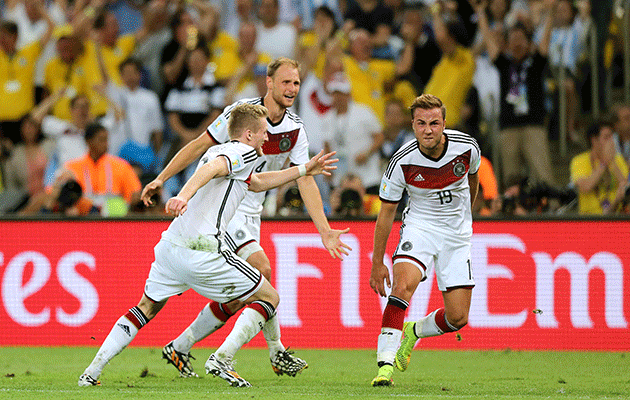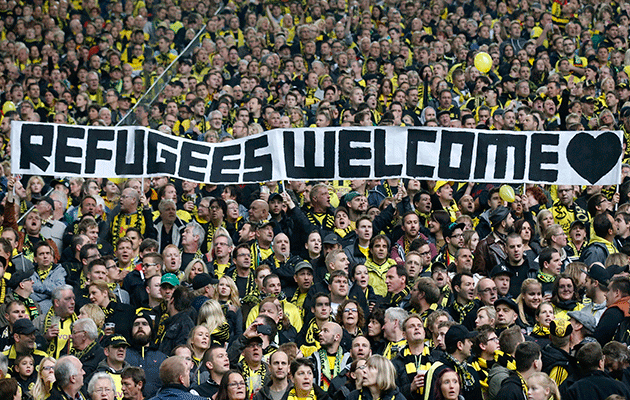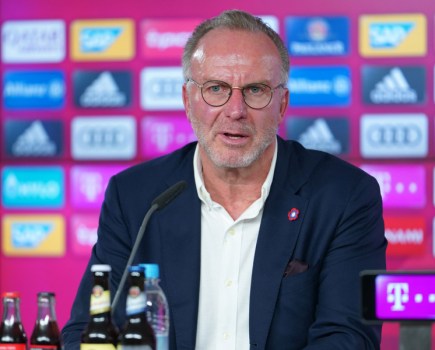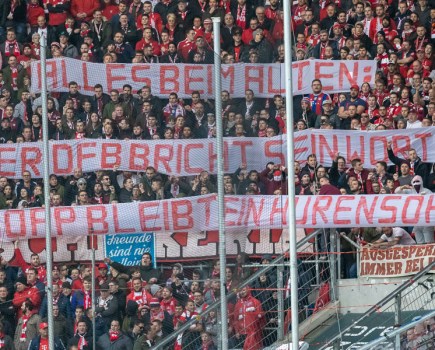1. Götze back with a bang
” It could have been worse. ” Nationalmannschaft forward and Bayern Munich misfit, Mario Götze certainly cultivated a nice line in understatement after his Man of the Match performance in Germany’s crucial 3-1 victory over Poland in Frankfurt on Friday, a result which put Joachim Low’s side back in control of Euro 2016 qualifying Group D.
Unable to hold down a regular spot at Bayern these past six months and criticised in some quarters for lacking heart, the goalscoring hero of the 2014 World Cup final has lost a great deal of his lustre in recent times, but was back to his twinkle-toed best against the Poles, scoring twice, hitting the post with another curling effort and from start to finish, giving a ‘false nine’ masterclass.
The attacking mix of his sumptuous dribbling skills and cute movement and Thomas Muller’s nose for space and dead-eye finishing represent’s Deutschland’s ace in the hole and it’s such a shame that they do not regularly line up together for Bayern. Why the stark contrast between Götze’s sparking form on the international stage and his fringe status for his club ? It’s all a case of trust and emotional chemistry. As much as Bundestrainer Löw values him like a son, Pep Guardiola remains dispassionately unconvinced
2. The ups and downs of Germany’s full-backs
In Joachim Löw’s system, the high-placement of both full-backs and their sense of adventure are vital elements in the overall scheme of things.
But at the moment, only one of the current pairing is managing to add value. While Köln left-back Jonas Hector was outstanding going forward in the Poland game – making both of Germany’s first two goals – new boy on
the right, Emre Can of Liverpool, did little to suggest against the Poles or the Scots that he is the long-term answer there, often in trouble positionally and imprecise in his distribution.
In mitigation, central midfield and not full-back is where he is most at home and given the scarcity of top-quality right-backs in the Bundesliga, Löw will have to make do and mend.
3. Gundogan makes his case
Firmly back in the saddle for Dortmund this season after a year out with a back complaint, highly versatile, midfielder Ilkay Gundogan might just have become the player the ‘Nationalelf‘ cannot do without.
Most impressive as a substitute against Poland, he started in the number ten role in the 3-2 victory in Scotland and was superb throughout, imaginative, always on the money with his passes and also on hand to net the winning goal.
Joachim Löw’s dilemma will be where to play him. For Dortmund he excels as the deep-lying middle of the park regulator and it could well be the case that he settles there for Germany, displacing either Bastian Schweinsteiger or Toni Kroos from one of the two central midfield holding slots. Gundogan offers more pace and tempo than the Manchester United and Real Madrid stars and that could give him the edge.
4. Bayern extend a helping hand in an hour of need
No one could accuse Angela Merkel’s German government of ignoring the refugee crisis sweeping Europe and as one of the country’s great institutions, Bayern Munich have been doing their bit too, handing over a million euros to a relief fund and concocting a plan to set up training camps for young displaced footballers.
Bayern director of sport, Matthias Sammer, declared it was the least the club could do, while Spanish midfielder, Javi Martinez even went as far as to greet the ‘trains of hope’ at Munich railway station, handing out balls and shirts.
5. The Transfer Window: Good or Bad?
With no fewer than twelve top-flight stars lured away in July and August by the riches on offer in the Premier League – the exodus featuring Player of the Year and Wolfsburg ace Kevin de Bruyne, Bastian Schweinsteiger, Hoffenheim’s Roberto Firmino and Leverkusen’s South Korean attacker, Heung-Min Son – thoughts naturally have turned to where it leaves the Bundesliga as a competition, entertainment and brand.
While some observers of the German scene worry that the flight of the headliners inevitably will reduce the league’s appeal and make it more difficult to attract sponsors and the TV companies, a much more prevalent view is that the English windfall (207 million euros, spending as much this summer on Bundesliga talent as they had in the previous seven years) should be an engine for the growth of the German game.
Bundestrainer Joachim Löw argues that more investment in youth development and facilities can only help the national team and it seems his words are being heeded. Mainz intend to use the proceeds from the 11 million euro sale of Japanese forward, Shinji Okazaki to Leicester City to build a new training centre and Augsburg, who recently sold full-back Baba Rahman to Chelsea for 25 million, also aim to upgrade their infrastructure.
“I don’t see our situation as dramatic, ” declared Löw. ” Most of our world champions still play in Germany. “







